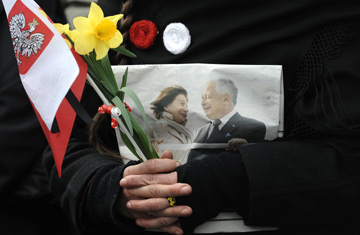
A person holds a Polish flag and a photo of Poland's late President Lech Kaczynski and his wife Maria during a public memorial service in Warsaw
It looked at first like the chance of a lifetime, if not a millennium. On April 10, when Polish President Lech Kaczynski and his entourage died in a plane crash in eastern Russia, the flood of grief from the Russian people struck such a chord in Poland that the long history of war, betrayal and oppression between the countries finally seemed to turn a corner. For the first time since anyone could remember, the two nations' leaders began to call each other brothers, a show of amity that would have been hard to imagine before the crash.
But over the past few days, a new cycle of recriminations has begun, helped along by a lack of tact on both sides. The Russians, having closed their official investigation into the tragedy, are stonewalling urgent questions from the Poles, while the Kaczynski family is calling the accident an assassination carried out by Russia. The two countries had the chance to make amends, but now the moment has passed.
That became clear on Jan. 12, when Russia's Interstate Aviation Committee held a press conference in Moscow to reveal the causes of the plane crash. With none of the Polish investigators in attendance, the head of the committee, Tatyana Anodina, launched into a stone-faced monologue that cleared the Russian side of all responsibility. All of the blame, she said, fell on the Polish flight crew, which her report accused of ignoring warnings from ground control and making other "absolutely illogical" mistakes. According to the report, for some reason they failed to heed the automated system that was screaming "Pull up! Terrain ahead!" inside the cockpit, and at one point a crew member — also inexplicably — pressed a button that skewed the altitude gauge, leading the pilot to believe he was about 525 ft. (160 m) higher than he actually was. Why the Russian control tower did not point out this mistake was not clarified in the report.
Most shocking of all to the Polish public, however, was the claim that the chief of the Polish air force, Andrzej Blasik, who was on board as part of the President's entourage, had been drinking (a point that Anodina took pains to emphasize) when he allegedly barged into the cockpit and demanded the pilots to land despite the heavy fog. The report also alleged that in August 2008, during the war in Georgia, President Kaczynski had insisted that the pilots change course at the last minute and land in the capital Tbilisi, instead of at an airport further away from the war zone, in order to save time. After the pilot refused, he was allegedly banned from flying the President's plane.
But two years later, the co-pilot on that flight to Georgia went on to fly Kaczynski and other prominent Poles to the Russian city of Smolensk. This time, says the Russian report, when his superiors insisted they land, the pilot obeyed. "If we don't land here, he'll give me trouble," he is heard saying on the flight recording that Russia released last week, allegedly referring to the President. The tape ends minutes later with chilling screams from inside the cockpit.
"This was very painful for the Polish people to hear," Polish parliamentarian Tadeusz Iwinski tells TIME. "Nobody in Poland is really questioning the great blunders committed by the Polish side, but the Russians could have admitted to some fault of their own. Instead, they didn't even use one word to say that of course some things could have been done better on their side." Why, for instance, wasn't the Russian airport closed if the weather conditions were so awful? And on the flight recording, why does the control tower keep telling the pilot that he is "on course, on the glide path" until seconds before the collision?
Without addressing these questions, Russian investigators pronounced the case closed, only to be confronted with an entirely different version of the facts on Tuesday, when the Polish Interior Minister Jerzy Miller placed much of the blame for the crash on the Russian control tower. At a televised press conference in Warsaw, he said the flight controllers were "working under intense pressure and made many mistakes ... They failed to support the crew during their approach." As evidence, he cited a control-room recording in which the plane is guided to a height of less than 330 ft. (100 m) before being told to pull up. This command, Miller argued, should have been given sooner. But as if to call his bluff, Russian investigators published a transcript of those recordings on Tuesday night. They appear to confirm Miller's account, but no one has explained why they were not disclosed in the first place.
